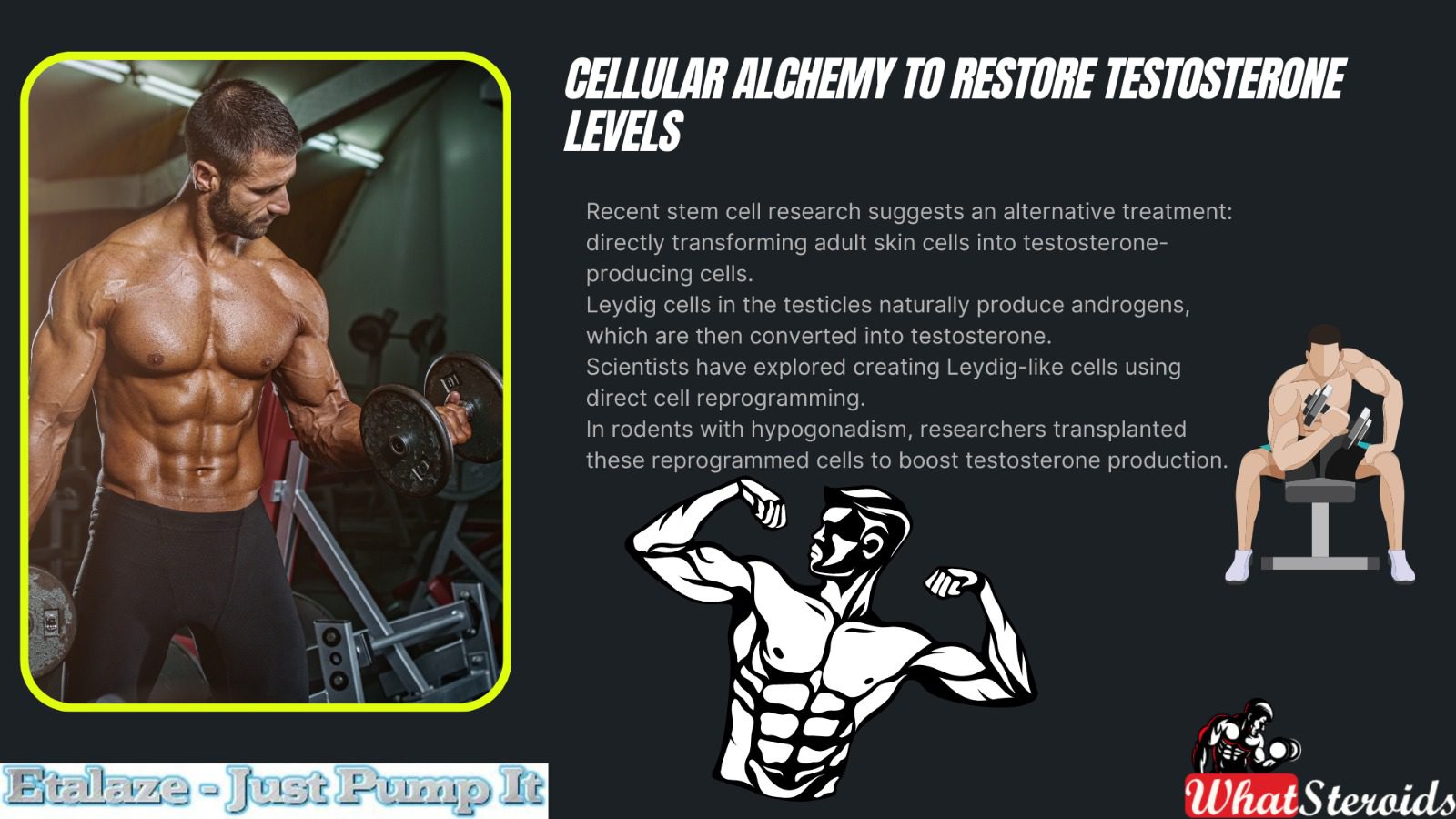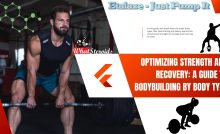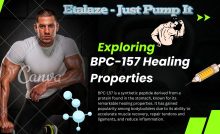Cellular Alchemy to Restore Testosterone Levels


The convergence of stem cell therapy and hormone regulation represents an intriguing frontier in medical research, especially regarding the possibility of enhancing testosterone levels. In this article, we shall explore cellular Alchemy from a bodybuilding perspective.
Anabolic testosterone, the essential male hormone, plays a crucial role in various bodily functions, including muscle mass maintenance, bone density, and mood regulation. As men age, natural declines in testosterone levels can lead to hypogonadism, significantly affecting their quality of life.
Stem cell therapy or cellular Alchemy offers a promising avenue for restoring testosterone levels, even in bodybuilders. Let’s delve into the details:
Background on Testosterone and Hypogonadism
Testosterone is crucial for male sexual development, cognitive function, and overall health.
As men age, testosterone levels naturally decline, leading to conditions like hypogonadism (abnormally low testosterone).
Hypogonadism can cause mood disturbances, reduced sex drive, and weakened muscle and bone strength.
Traditional Approach: Testosterone Replacement Therapy (TRT)
The common clinical approach is anabolic testosterone replacement therapy (TRT).
However, TRT has significant side effects, including venous thromboembolism and deep vein thrombosis.
Stem Cell Research and Alternative Treatment
Recent stem cell research suggests an alternative treatment: directly transforming adult skin cells into testosterone-producing cells.
Leydig cells in the testicles naturally produce androgens, which are then converted into testosterone.
Scientists have explored creating Leydig-like cells using direct cell reprogramming.
In rodents with hypogonadism, researchers transplanted these reprogrammed cells to boost testosterone production.
Must Read: Muscle Disorders: Diagnosis, Treatment and Coping Routine
Implications for Bodybuilders
Stem cell therapy could benefit bodybuilders by:
Enhancing muscle growth: Stem cells may stimulate muscle repair and regeneration.
Improving recovery: Faster recovery after intense workouts.
Alleviating symptoms: Reduced libido, fatigue, and muscle loss associated with low testosterone.
Stem cell therapy for testosterone restoration is an exciting field, but it’s essential to understand both its potential benefits and risks. Let’s explore:
Testosterone Replacement Therapy (TRT) Risks
TRT is the common clinical approach for hypogonadism (low testosterone).
However, TRT has notable side effects, including:
Increased risk of blood clots: TRT can lead to elevated red blood cell production, potentially causing blood clots.
Sleep apnea risk: Some individuals on TRT may experience interrupted breathing during sleep.
Testicular atrophy: The testicles may shrink due to TRT.
Prostate growth: Regular prostate cancer monitoring becomes necessary.
Stem Cell Therapy Approach
Recent research explores an alternative: directly transforming adult skin cells into anabolic testosterone-producing cells.
Scientists aim to create Leydig-like cells using direct cell reprogramming.
Leydig cells in the testicles naturally produce androgens, which then convert into testosterone.
In rodent studies, researchers transplanted these reprogrammed cells to boost testosterone production2.
Implications and Caution
Stem cell therapy shows promise, but it’s still experimental.
Risks associated with stem cell therapy are not fully understood.
Safety, efficacy, and long-term effects need further investigation.
Cellular Alchemy Success Rate
Stem cell therapy for anabolic testosterone restoration shows promising results, particularly in the context of male hypogonadism. Let’s explore the success rates based on recent research:
Background on Male Hypogonadism
Male hypogonadism is characterized by abnormally low testosterone levels.
It can lead to mood disturbances, reduced sex drive, and decreased muscle and bone strength.
Approximately 30% of older men are affected by this condition.
Common Clinical Approach: Testosterone Replacement Therapy (TRT)
TRT is the standard treatment for hypogonadism.
However, TRT has significant side effects, including venous thromboembolism and deep vein thrombosis.
Stem Cell Research and Leydig-Like Cells
Scientists have explored an alternative using stem cells.
They directly transform adult skin cells into Leydig-like cells, which produce androgens and then biosynthesize testosterone.
In rodent studies, these reprogrammed Leydig cells were transplanted into testosterone-deficient animals.
Remarkably, the cells survived and restored normal testosterone levels in males with hypogonadism.
Success Rate
While individual outcomes may vary, stem cell therapy has shown promise.
Success rates are not universally defined, but the approach offers an exciting alternative to androgen replacement therapy.
Related Article: First Injectable Steroid Cycle
Holistic Approach to Men’s Health
Research Progress: As scientific knowledge advances, we recognize that health interventions should consider the whole person, not just isolated aspects.
Stem Cell Therapy: This emerging field offers potential benefits for various health conditions, including hypogonadism (low testosterone).
Holistic View: Rather than focusing solely on stem cell therapy, we should integrate it into a broader approach that considers lifestyle factors.
Lifestyle Factors and Testosterone
Diet: Proper nutrition is crucial. Certain nutrients (like zinc and vitamin D) support testosterone production.
Exercise: Regular physical activity, especially resistance training, positively influences testosterone levels.
Stress Management: Chronic stress can lower testosterone. Techniques like meditation and relaxation help maintain hormonal balance.
Complementary Role of Stem Cell Therapy
Enhancing Well-Being: Stem cell therapy complements lifestyle efforts.
Managing Hypogonadism: It can address anabolic testosterone deficiency, but it’s not a standalone solution.
Synergy: Combining stem cell therapy with lifestyle changes creates a comprehensive strategy.
Overall Health: This approach benefits not only testosterone levels but also overall health and vitality.
Viewing stem cell therapy holistically involves integrating it with lifestyle choices, creating a synergistic approach to men’s health.
Dietary Recommendations to Support Cellular Alchemy
When it comes to managing hypogonadism, dietary choices play a crucial role. Here are some dietary recommendations:
Nutrient-Rich Foods
Zinc: Include foods like oysters, beef, pumpkin seeds, and legumes. Zinc supports testosterone production.
Vitamin D: Fatty fish (salmon, mackerel), fortified dairy products, and sunlight exposure help maintain healthy levels.
Healthy Fats: Avocado, nuts, and olive oil provide essential fats for hormone synthesis.
Avoid Excessive Alcohol and Sugar
Alcohol can negatively impact testosterone levels.
High sugar intake may lead to insulin resistance, affecting hormonal balance.
Protein Intake
Adequate protein supports muscle growth and overall health.
Include lean meats, eggs, and plant-based protein sources.
Anti-Inflammatory Foods
Chronic inflammation can affect testosterone.
Consume fruits, vegetables, and whole grains to reduce inflammation.
Natural Alternatives to Cellular Alchemy
If you’re looking for natural ways to boost anabolic testosterone without relying on cellular alchemy, consider the following strategies:
Ashwagandha Supplement
Ashwagandha, an adaptogenic herb, has been linked to reduced stress and increased testosterone levels.
In studies, it improved muscle strength and testosterone in men who took 600 mg daily for eight weeks.
Note that it didn’t have the same effect on women.
Prioritize Sleep
Aim for 7-9 hours of quality sleep each night.
Lack of sleep can lower testosterone levels, so prioritize rest.
Optimize Vitamin D
Vitamin D deficiency is associated with low testosterone.
Get sunlight exposure or consider supplements if needed.
Dietary Choices
Certain foods can help raise testosterone:
Grass-fed beef: Rich in nutrients and healthy fats.
Zinc-rich foods: Oysters, beef, and pumpkin seeds.
Vitamin D sources: Fatty fish and fortified dairy products.
Keep in mind that a holistic approach that combines lifestyle changes, nutrition, and natural supplements can contribute to maintaining healthy anabolic testosterone levels. Always consult a healthcare professional for personalized advice.
Overall
As a general recommendation, we advise caution regarding cellular alchemy. While it shows promise for testosterone restoration, it remains experimental. Consult a healthcare professional before considering it. For bodybuilders, natural alternatives (like lifestyle changes and supplements) are safer and more widely applicable.
Also Read: Meet the World’s Strongest Grannies
Recent Posts
Optimizing Strength and Recovery: A Guide to Bodybuilding by Body Type
Every body tells a different story—and in bodybuilding, honoring that story is the key to…
Fitness Lessons from A Navy Seal’s Training Routine
Navy SEAL training is designed to forge elite tactical athletes. It’s not your average gym…
Exploring BPC-157 Healing Properties
BPC-157 is a synthetic peptide derived from a protein found in the stomach, known for…
The Ultimate Guide to Foods That Support Hormonal Balance for Bodybuilders
Hormonal balance is crucial for bodybuilders aiming to maximize muscle growth, recovery, and overall health.…
Steroid Shops Review
osgear.se Reviews ⭐⭐⭐⭐⭐ Score: 97.78% Osgear has consistently maintained a 99% customer satisfaction rate across key…
ACE-031: A Powerful Myostatin Inhibitor
ACE-031 is a synthetic peptide designed to block myostatin, a natural regulator of muscle growth.…



